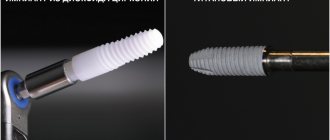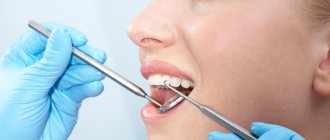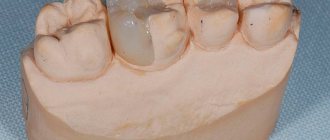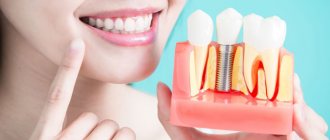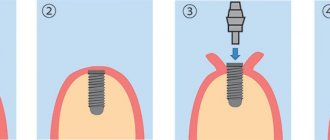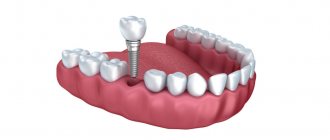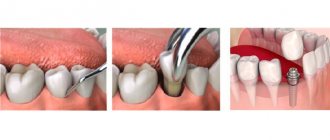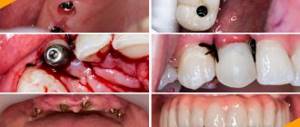Teeth in 1 day is not an unfounded advertisement or a special method of treatment. This is the name given to a set of implantation techniques with immediate loading of a prosthesis, which allows you to restore the integrity of the dentition in one procedure. One-stage prosthetics on implants eliminates a separate period of osseointegration. The adaptive orthopedic structure is fixed to the implants immediately after their implantation. As a result, the patient receives fully functional teeth, which are immediately involved in the chewing process.
Implantation according to the “teeth in 1 day” protocol at the ILATAN clinic
At the Ilatan Clinic, implantation in 1 day is a procedure that requires 2-3 patient visits. After consultation and examination, the doctor will draw up a treatment plan, agree with the patient on the treatment regimen, the date of implantation and prosthetics. The Ilatan Clinic is one of the few dentists in Moscow that uses all modern protocols with immediate prosthetics.
Which treatment method is best to use? The choice of a specific technique depends on the number of missing teeth, the quality of the jaw bone, the presence of dental diseases (periodontal disease, periodontitis, etc.), and the anatomical features of the jaw system.
- One-stage implantation with instant loading
- indicated for partial (no more than 3 units nearby) or complete absence of teeth. Monoblock implant models are used, which are implanted using a surgical template or under CT guidance into areas of the bone with the most suitable parameters. Inclined installation in the lateral sections increases the area of contact between the structure and the bone and provides the implants with high primary stability. A temporary prosthesis is placed for a year, then it is replaced with a permanent orthopedic system.
- One-stage technology
- this protocol is used in the presence of teeth that are subject to removal with further prosthetics. This is the only protocol that can be called non-surgical. The implant is fixed simultaneously into the tooth socket after its surgical extraction. You can immediately get new teeth if a number of conditions are met - atraumatic tooth extraction, absence of inflammation around the root (no cysts, granulomas), good bone quality. - All - on and All - on concepts are
techniques suitable for patients with missing teeth in the jaw. According to the clinical picture, the patient is implanted with 4 or 6 implants - 2 vertically in front, 1 or 2 each (respectively), in the lateral areas, at an angle of 45°. A temporary prosthetic structure of 10 or 12 artificial crowns is immediately attached to them. Re-prosthesis with a permanent structure is carried out after complete fusion of artificial roots and bone. - Mini-implantation
is a special protocol when miniature implants are used, fixed not into the central bone, but into the superficial layer of the alveolar edge (immediately under the mucosa). The technology involves loading exclusively with a removable denture and allows you to restore a toothless jaw in 1 day. Not suitable for fixed prosthetics.
After only 4-6 months, the implants will fuse with the jawbone, but this will go unnoticed for the patient, since he will begin to use the new teeth immediately. Regular load on the jaw activates the regeneration of osteoblasts and accelerates the formation of new bone around the titanium root.
Indications/Contraindications.
Implantation is prescribed only for medical reasons; the one-step technology is suitable for those patients who want to return their smile to its previous appearance in just a few days. Based on the results of the examination and examination, the doctor will choose the appropriate implantation method for you. The option of installing an implant in one day may be recommended in the following cases:
- On the day of extraction of a tooth that cannot be saved.
- When a unit of the dentition is destroyed by more than half and the root is fractured, when there is no other way to restore it.
- If you have diseases of the gums and teeth that require an extraction procedure.
- The need to restore the anterior incisors and canines.
Before the operation, the patient must consult a doctor and undergo an examination. In some cases, dental implantation in 1 day may not be recommended. To eliminate risks, the dentist conducts a survey and examination in order to identify diseases and other pathologies in the patient that may be an absolute contraindication to restoring teeth with implants.
Contraindications include:
- Malignant tumors.
- Blood clotting disorders.
- Diabetes.
- The presence of an allergic reaction to the drugs and materials used.
- Diseases of periodontal tissues at the last stage.
- Osteoporosis.
- Psychical deviations.
- Heart diseases.
- Bone tissue atrophy (you will need to undergo bone grafting first).
- Tuberculosis, HIV, AIDS.
Stages of treatment
- Preparatory
– comprehensive examination (orthopantomogram, 3D scanning, laboratory tests), computer simulation of the operation, selection of an implantation system, oral sanitation, treatment of teeth and gums (according to indications). - Surgical
– the doctor installs implants by puncturing the gums (translingual method) or in the bed of an extracted tooth, correcting the angle of the abutments for an anatomically correct position of the prosthesis. - Orthopedic
– a few hours (maximum 3 days) after the intervention, the implants are loaded with a prosthesis. A lightweight metal-plastic structure, adjusted to the patient’s bite, additionally stabilizes the artificial roots, eliminating the possibility of their displacement.
After osseointegration of the implants with the jaw bone, the temporary orthopedic structure is replaced with a permanent one (metal-ceramic, zirconium).
What are the indications for All on Four dental implants?
One of the indicators can be the small volume of bone tissue in both the upper and lower jaws. It is especially problematic with the required volume of bone tissue for implantation in the chewing sections, since in the absence of teeth for quite a long time, the volume of bone tissue in these sections decreases, and this happens even when using removable dentures. In order to install the number of implants required for fixing fixed prostheses (from 6 to 10), a preliminary operation is required to restore the required bone volume. Only after this are implants installed, and after some time (from three to eight months) prosthetics are performed on them.
Tips on how to choose a clinic and doctor for treatment?
- Make sure that the clinic actually carries out the procedures that it claims, if there are any necessary licenses, certificates, or permits.
- Carefully familiarize yourself with what implantation systems the clinic operates. It is necessary to install implants and superstructures of the same brand. The doctor opens the package only in front of the patient.
- The doctor must have sufficient experience in performing such operations; if the implantologist has performed 2-3 interventions, it is better not to take risks.
- Find out whether the clinic provides a guarantee for the doctor’s work and other services. Warranty obligations must be stated in the contract.
- Analyze customer reviews, list of services, view equipment, examples of work. Compare the cost of services.
Possible complications after installation of implants
With careful attention and compliance with the rules of hygiene, nutrition, maintaining health and following all doctor’s recommendations, complications rarely occur. For example, the risk of implant rejection does not exceed 1–2% of all cases. But the likelihood of peri-implantitis is higher, since it directly depends on the patient’s actions during the rehabilitation period and in the future.
Read about what is considered normal after surgery and when to sound the alarm in the material on the website: “Life and feelings after implantation.”
Condition in the first few days after surgery
Among the complications, there are early manifestations that relate to the consequences of the operation and do not require intervention. With proper care, they disappear on their own within 3-4 days. Among them are bleeding of wounds, which stops within 24 hours, pain after injury, swelling of soft tissues, possible numbness of areas, and increased temperature.
If the consequences of surgical intervention are more pronounced or first passed and then returned again, then this is a serious reason to consult a doctor again for help.
DENTAL PROSTHESIS WITH 4 OSSTEM IMPLANTS FOR 1 JAW - RUB 130,000.
Implantation even with bone tissue atrophy. Work guarantee! Save RUR 20,000.
on promotion >> Free consultation with an implantologist +7 (495) 215-52-31 or write to us
The appearance of alarming symptoms after two weeks or more
Postoperative complications are possible. Among their reasons are:
- injury to the jaw nerve: manifested by severe numbness of areas on the face, can last quite a long time (up to six months), goes away on its own when blood circulation is restored,
- damage to the seams and their separation: they will need to be re-applied,
- perforation of the bottom of the nasal sinus: it is important to choose the desired size of the implant to be installed. Exceeding the permissible values can cause damage to the sinuses, which will manifest itself as a prolonged runny nose, sinusitis, leakage of fluid from the nasal cavity,
- implant loss: hardly possible with a professional, but there is a possibility of a discrepancy between the implant bed and the size of the structure itself.
The most recent complications include peri-implantitis and implant failure. If alarming signs appear, you should immediately consult a doctor to prevent even more serious consequences. Now there are effective methods to combat bacterial plaque around implants, ranging from the special surfaces of the structures themselves and hygienic requirements, to advanced methods of therapy[1].
Read more about complications and measures to prevent them in the article “Complications during implantation.”
Implantation in one day: MYTHS and REALITY
Single-stage implantation technologies are a fairly new development, so there are a lot of rumors and speculation around them.
- MYTH 1: You can only get teeth inserted in one day abroad
Working with any implantation protocol requires a highly qualified doctor, and one-stage techniques are no exception. Today, not all Moscow clinics work with immediate loading protocols. The Ilatan Clinic was one of the first Moscow dentistry to introduce single-phase punctures, so it can definitely say that teeth in one day in Moscow with a predictable result is not a fairy tale, but a reality.
- MYTH 2: Implantation is done under anesthesia
Installation of implants using one-stage techniques does not involve cutting the gums, cutting bones, or suturing wounds. Implants are screwed into the jaw translingually or fixed into the sockets of extracted teeth. The procedure is performed under local anesthesia; installation of 1 implant takes no more than 10 minutes. For patients with panic attacks, the possibility of sedation (implantation during sleep) is provided.
- MYTH 3: Immediate loading implants often fail to survive.
If you follow medical instructions in the postoperative period, the implantation of the artificial root takes place quickly and without problems. After 4-6 months, the implant firmly fuses with the bone, the risk of rejection does not exceed 2%, as with the classic two-stage method.
- MYTH 4: After loading with a prosthesis, you need a strict diet
For the first few weeks, the patient is advised to follow a soft diet to minimize the risk of displacement of the artificial root due to excessive chewing load. You also need to exclude irritating foods and drinks. You can return to eating without restrictions after 4-5 weeks.
- MYTH 5: One-stage implantation has many contraindications
One-stage techniques, like any operation, have limitations. But there are much fewer of them compared to the two-step protocol. New technologies make it possible to implant dental implants in people with HIV, diabetes, periodontal disease, critical deficiency of jaw tissue and many other pathologies that not so long ago made implant-based prosthetics impossible.
Which is better: All-on-4 or classic implantation?
The main goal of our activities is to introduce implant prosthetics using the ALL-ON-4 method into everyday practice and to popularize this method both among doctors and patients. We want high-quality dental implantation to be available to as many people as possible, regardless of their income and area or region of their residence. Come to us and you will, without a doubt, be satisfied with the result of the treatment. EspaDent - Your dentistry!
Complete or partial loss of teeth causes enormous discomfort and significantly reduces the quality of life. How do those who have lost their teeth due to injury or age solve the problem? Most dental clinics in Russia offer such patients traditional implantation of each tooth. However, this method requires sufficient bone tissue and good health. Otherwise, the tissue has to be augmented and this is a rather painful procedure, and in the presence of a wide range of diseases, the patient will most likely be denied surgery.
How much does implantation cost in 1 day?
The cost of implantation using the immediate loading method is lower than the cost of two-stage treatment. This was made possible by reducing visits to the doctor and eliminating the need for bone grafting. Promotions and discounts that are regularly held at the Ilatan clinic allow you to insert teeth in one day “turnkey” on favorable terms. The cost is fixed in the contract and does not change during treatment. The turnkey price includes all necessary procedures and manipulations, from implant installation to follow-up examinations. You can ask your doctor any questions you have during a consultation or online by filling out the form on the website.
In what cases is simultaneous implantation with permanent crowns possible?
In very rare cases, a permanent crown is immediately fixed to the patient on the day of implantation. To do this, the patient's bone and gums need to be in perfect condition. To perform such an operation, the clinic must use R2Gate software, thanks to which the entire treatment regimen can be planned on a computer. Without digital planning, such manipulations cannot be carried out. If these conditions are met, the clinic’s doctors will prepare permanent crowns and abutments in advance. Not every doctor will undertake such a task and not every clinic can perform such an operation. The Dental Guru network of clinics has all the necessary equipment and software, its own digital laboratory and the most experienced implantologists. If you require implantation of one or two teeth, contact our clinic - you may be one of the lucky ones who can receive permanent crowns on the day of implantation.
